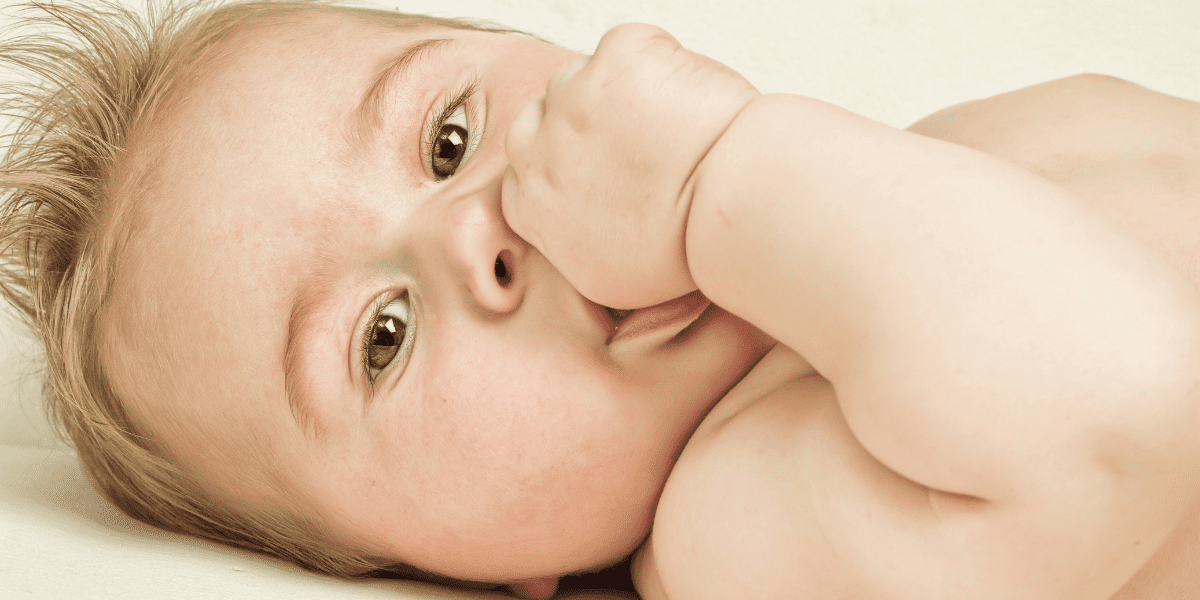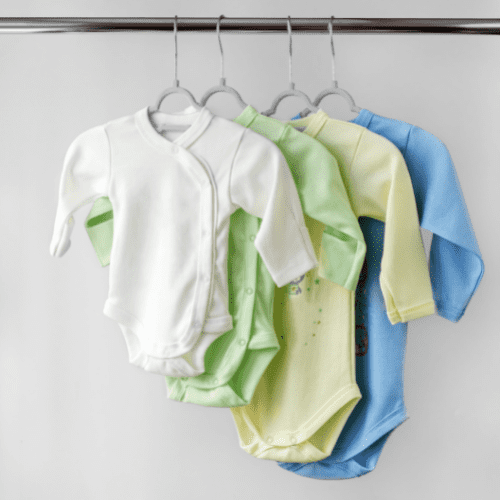As a new mom, you probably prepared yourself for the sleepless nights and constant feeding. But did you prepare yourself for the common issue that is newborn gas?
What is newborn gas? Well, gas is caused by a buildup of air in your baby’s immune system. In cases where this build-up of gas happens often and a baby is known to cry for hours, daily this can be referred to as colic.
This build-up of air can happen for lots of reasons but the large intake of air most commonly happens when they are feeding or have been crying for long periods.
Another cause is because babies have immature immune systems and can be affected by certain types of formula or their mom’s diet if you are breastfeeding.
Whilst most babies grow out of this problem by the time they are 4 – 6 months old they do pass gas anywhere between 13 – 21 times a day.
As an Amazon Associate, I earn from qualifying purchases. The links below may be affiliate links. Please read my disclosure policy for more information.
How do you tell if your baby is suffering from a build-up of gas?
There are several ways in which your baby will communicate to you that they are in pain or discomfort from a build-up of gas.
- Crying – It is normal for your newborn to cry but if they are crying for more than an hour and this is happening every day then it is likely to be because of a gas build-up and they are feeling uncomfortable.
- Arching their back – Babies suffering from colic will arch their back and clench their fists. It becomes very obvious that they are experiencing physical discomfort.
- Firm Abdomen – If your baby’s belly feels firm to the touch then it is likely they have trapped wind.
- Reduced appetite and sleep – If you have noticed your newborn isn’t eating as well as normal or isn’t sleeping as much it could be because the discomfort from a gas build-up is affecting their ability to fall asleep and putting them off their food.
Whilst these signs are common indicators of newborn gas, you should contact your pediatrician if the symptoms do not seem to be getting better after a few days.
Newborn gas can cause great discomfort but could also be a symptom of a much bigger problem, if you are worried, trust your instincts and get your baby checked out.
If your baby does appear to show the signs they are suffering from newborn gas there are some methods you can try at home to help ease their pain and discomfort.

Warm Bath
A simple warm bath can be a great tool for soothing your baby. Babies naturally relax when submerged in warm water and this will help their digestive system work more effectively.
The warm water will also soothe their tender abdominal muscles.
As an added effect soak a soft towel in warm water and use it as a compress, gently massaging your baby’s belly.
The Pedalling Massage
Also known as the ‘bicycling method’ this is a massaging technique that you can do to encourage your newborn baby to release trapped wind.
The best time to attempt this massage and to ensure your baby gets the most out of it is when your newborn is calm and content.
If at any point during the massage your baby begins fussing and is visibly upset you should stop the massage and attempt it at a later time. It is also suggested that you should not attempt the massage until at least 45 minutes after your newborn has had a feed.
This is in case they vomit. Gently lie your baby on their back and move your baby’s legs in the air to imitate riding a bicycle.
This will help move trapped gas through their system. You can also hold both legs together at a slightly bent angle and gently twist their hips from side to side.

Burping
A preventative method for newborn gas is burping your baby. But rather than waiting until after they have finished feeding you should try burping them halfway through their feed.
This will eliminate a build-up of the air bubbles they intake when they feed.
Do not alternative breasts
If you are breastfeeding you may have been told that in order to keep your milk supply up you will need to alternate your baby between both breasts when feeding, and whilst this is true, your baby could benefit from sticking to one breast for a little longer.
The first milk your baby ingests is called “foremilk” but if you allow your baby to nurse a little longer they get to the “hindmilk”. This is not only more nutritious but also contains more fat.
This fat helps with digestion and in turn, then eases digestional distress.
Diet
Your baby’s gas build-up could be an indication that they are suffering from a reaction to the food you ingested. This can be avoided with careful tweaks to your diet.
Foods to avoid include anything spicy or too acidic.
Often dairy products can cause an allergic reaction, Cow’s Milk Protein allergies (CMPA) are common in babies under 12 months old.

Peppermint Oil
If you are interested in a holistic approach you should consider using peppermint oil. You should be cautious using peppermint oil and only use it if you have spoken to your doctor first.
This is because peppermint oil in its concentrated form can be fatal to babies under 30 months.
So in order for it to be used, it will need to be heavily diluted. Once diluted you can use it to massage your newborn baby’s tummy.
Gently rub in a semi-circle from left to right over the belly button to stimulate the digestive tract.
Gripe Water
Another herbal remedy that is a favorite with moms is gripe water. Gripe water is essentially a mixture of different herbs and water.
You should not use Gripe water if your baby is under 2 weeks of age. The recommended amount is 2.5ml for babies aged between 2 weeks and 1 month old.
This herbal remedy helps reduce gas build-up, the ingredients in it include Ginger and Fennel which have been known throughout history to ease discomfort and nausea.

Swap the bottle
If you are bottle feeding and your baby is experiencing newborn gas it could be because of the teat on their bottle. This happens when a baby isn’t latching on to the teat correctly and is taking in a lot of air.
Bottles and their teats can be bought for the different stages of a baby’s growth and a good way to judge whether your baby has the right teat is to time how quickly they finish a bottle.
A breastfed baby is normally full after feeding for around 20 minutes with the maximum being an hour. If your baby is gulping down their bottle within 5 minutes the flow on the teat is too wide, your baby is struggling to keep up and is gulping in lots of air.
A universally recommended bottle brand is the MAM bottle.
This bottle is built with anti-colic properties including a soft teat that mimics the softness and flexibility of a mother’s nipple and an even drinking flow so your baby can relax whilst they drink. This reduces digestive distress.
The Shoulder Hold
Newborn gas has been known to be worse at night time. A simple way to combat this is to feed your baby in a semi-upright position.
Once you have finished bring them fully upright and rest them slightly bent over your shoulder to be burped. If you are in a comfortable enough position you are encouraged to allow them to fall asleep resting over your shoulder.
Not only is it a comfortable position for them but the pressure from your shoulder pushing on their tummy forces them to release built-up gas.
If you do not see an improvement after trying these methods or spot one of the following issues then you need to speak with your doctor straight away as there may be a more serious problem presenting itself
- Your baby is suffering from constipation or you notice they pass blood in their stool
- Your baby doesn’t want to feed
- Your baby isn’t gaining weight
- Your baby has an allergic reaction (e.g hives, a rash, trouble breathing, swollen tongue)
- Your baby cries for more than 3 hours a day on a daily basis.

Remember, in most cases, gas is a common problem in newborns. This is due to immature digestive systems and swallowing too much air both when they are feeding and when they are crying.
This problem may be worse at night and can cause many sleepless nights for you and your little one.
But with the help of the few simple home remedies and preventative measures listed above, you will be able to ease your baby’s discomfort.
If it starts to feel hopeless and none of the tricks above seem to be helping then it may just be a case of waiting it out.
As your baby develops their digestive tract will mature and by around 6 months old the issues they were having will have completely disappeared.







